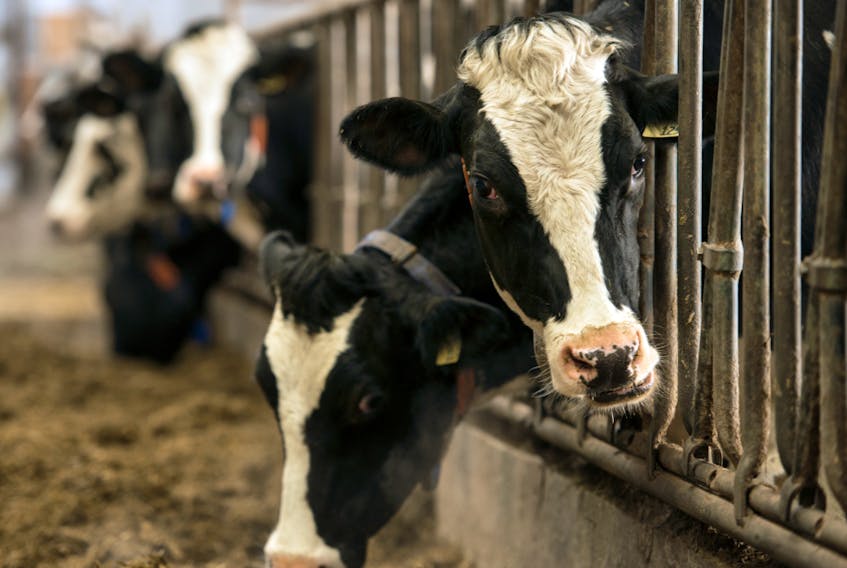Gordon MacBeath, a P.E.I. dairy farmer for 42 years, says he works harder now to make a living than he has in two or three decades.
The reason is that a difficult time for dairy farmers dealing with the uncertainty and financial impact of COVID-19 is about to get more challenging on July 1 when the Canada-U.S.-Mexico trade deal comes into effect. It will see dairy farmers lose 3.59 per cent of the Canadian market to U.S. producers.
But when two other trade deals are considered (the Comprehensive Economic and Trade Agreement with the European Union and the Comprehensive and Progressive Trans-Pacific Partnership), the total impact will be about 18 per cent of the Canadian market going to foreign dairy producers.
"The capital costs are so high now that the margins are very tight. Every time you lose a per cent or two of market access, it doesn't sound like very much, but it is," said MacBeath, a fifth-generation dairy farmer in Marshfield and chairman of Dairy Farmers of Prince Edward Island.
"It's hard to regain that market. You ask any business to give up 18 per cent of their sales, then that makes it that much tougher. So, we have to try and adjust to that reality."

MacBeath said the industry has been on a rollercoaster since mid-March and the arrival of COVID-19. Demand for dairy products dropped when schools, restaurants and coffee shops were forced to close or reduce services. Consumer sales did increase but not enough to offset the losses, he said.
With businesses reopening, MacBeath said, dairy production has rebounded to be down only by about five per cent compared to mid-March and before.
The response to the trade deals will be less production from the Canadian dairy industry and lower profit margins. They also restrict what Canadian dairy producers can export elsewhere, for example, skim milk powder.
Another concern is what happens if a second wave of COVID-19 hits and forces businesses to close again.
"It's not what we've lost so far. We can recover from that. It's what happens going forward. If there is a second wave or market demand drops, then those losses start to compound. And then you're in trouble.”
- Gordon MacBeath
"It's not what we've lost so far. We can recover from that," MacBeath said.
“It's what happens going forward. If there is a second wave or market demand drops, then those losses start to compound. And then you're in trouble.”
Often referred to as the new NAFTA, the Canada-U.S.-Mexico trade deal was first signed by the three countries in November 2018. A revised version was agreed to in December 2019, and the Canadian government ratified the deal on March 13.
It also has implications for other aspects of the agricultural sector, such as eggs and poultry, as well as the auto industry.
For many Islanders, Oct. 5, 2018, is a date that stands out. On that day, more than 100 farmers showed up at an unrelated funding announcement by then-federal agriculture minister Lawrence MacAulay in Pooles Corner to protest the trade deal.

When MacBeath thinks back to that day, he's reminded how quickly the deal has been pushed through, especially since the industry was under the impression that the previous two trade deals would be the last ones.
He said the July 1 implementation date of the newest deal has meaning.
"It's not lost on us that the dairy farmers paid a significant price to have that trade deal come into effect. And, it's not lost on us that it's coming into effect on Canada Day. We gave up some of our sovereignty for that," he said.
July 1 is also problematic for dairy farmers since the industry's fiscal year begins on July 31 and ends the following Aug. 1 each year. That means the first of five yearly implementation stages will be in place for only one month. Aug. 1 will mark the beginning of Year 2 of the agreement, said MacBeath.
"All of the sudden, you have more of the Year 2-level imports coming in within a month of it being implemented.”
Sylvain Charlebois, director of the Agri-Food Analytics Lab at Dalhousie University, said Canadian dairy producers will remain profitable once the third trade deal takes effect, but there will be fewer of them.

He expects the deal to be more impactful in Ontario and Quebec because of the number of dairy processors compared to Atlantic Canada.
Charlebois sees the three agreements combined having the biggest impact.
"The trade deals are a huge hit because you basically lose a part of your industry. And, that's the third time in the past few years," he said.
Even though it may not lead to lower prices, Charlebois said, opening up the market to foreign producers is good for Canadian consumers because it gives them more choice at the grocery store.
Even so, MacBeath expects local support for the dairy industry to continue. He notes that supporting local and Canadian producers is important because every time someone buys a locally produced carton of milk or a block of cheese, there are families and jobs behind those products.
"They're buying local and they're buying Canadian, and that's significant.”









